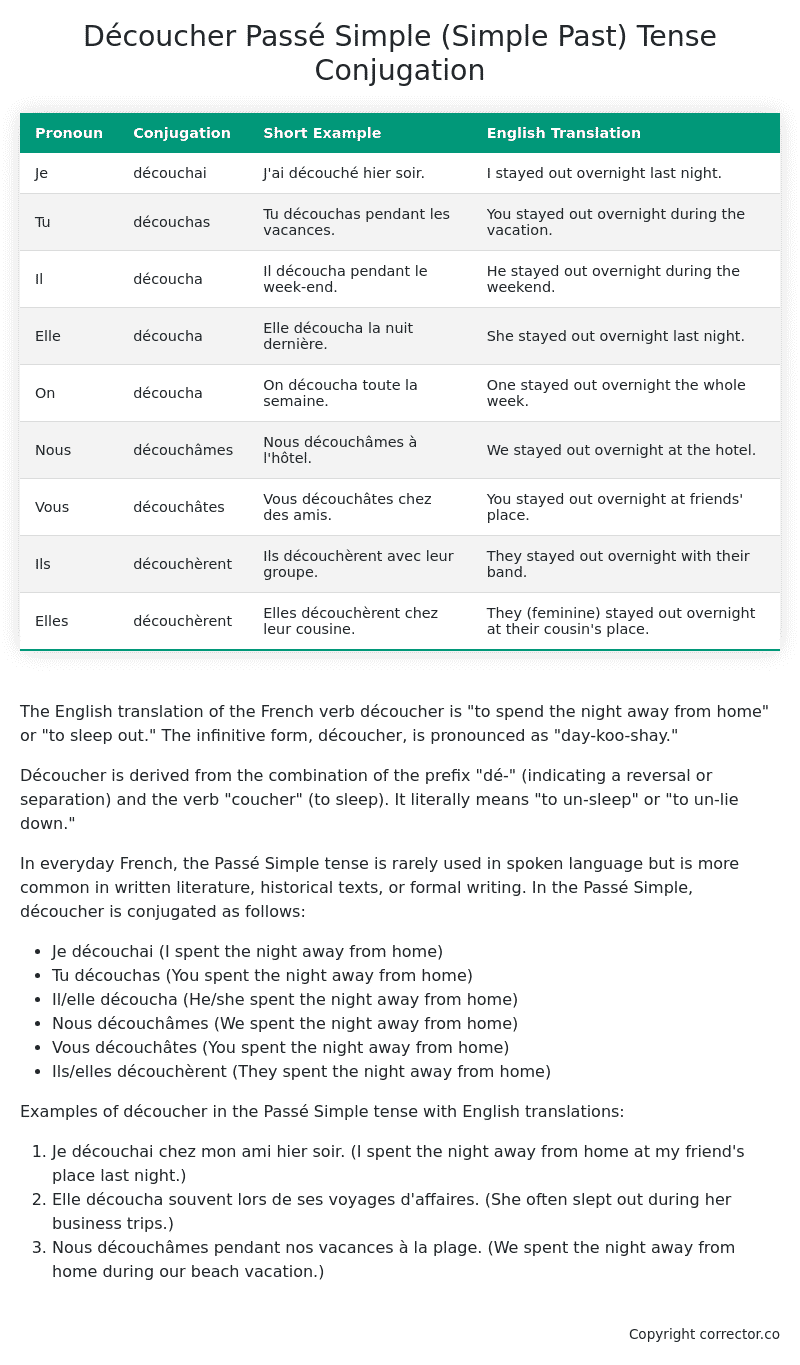Passé Simple (Simple Past) Tense Conjugation of the French Verb découcher
Introduction to the verb découcher
The English translation of the French verb découcher is “to spend the night away from home” or “to sleep out.” The infinitive form, découcher, is pronounced as “day-koo-shay.”
Découcher is derived from the combination of the prefix “dé-” (indicating a reversal or separation) and the verb “coucher” (to sleep). It literally means “to un-sleep” or “to un-lie down.”
In everyday French, the Passé Simple tense is rarely used in spoken language but is more common in written literature, historical texts, or formal writing. In the Passé Simple, découcher is conjugated as follows:
- Je découchai (I spent the night away from home)
- Tu découchas (You spent the night away from home)
- Il/elle découcha (He/she spent the night away from home)
- Nous découchâmes (We spent the night away from home)
- Vous découchâtes (You spent the night away from home)
- Ils/elles découchèrent (They spent the night away from home)
Examples of découcher in the Passé Simple tense with English translations:
- Je découchai chez mon ami hier soir. (I spent the night away from home at my friend’s place last night.)
- Elle découcha souvent lors de ses voyages d’affaires. (She often slept out during her business trips.)
- Nous découchâmes pendant nos vacances à la plage. (We spent the night away from home during our beach vacation.)
Table of the Passé Simple (Simple Past) Tense Conjugation of découcher
| Pronoun | Conjugation | Short Example | English Translation |
|---|---|---|---|
| Je | découchai | J’ai découché hier soir. | I stayed out overnight last night. |
| Tu | découchas | Tu découchas pendant les vacances. | You stayed out overnight during the vacation. |
| Il | découcha | Il découcha pendant le week-end. | He stayed out overnight during the weekend. |
| Elle | découcha | Elle découcha la nuit dernière. | She stayed out overnight last night. |
| On | découcha | On découcha toute la semaine. | One stayed out overnight the whole week. |
| Nous | découchâmes | Nous découchâmes à l’hôtel. | We stayed out overnight at the hotel. |
| Vous | découchâtes | Vous découchâtes chez des amis. | You stayed out overnight at friends’ place. |
| Ils | découchèrent | Ils découchèrent avec leur groupe. | They stayed out overnight with their band. |
| Elles | découchèrent | Elles découchèrent chez leur cousine. | They (feminine) stayed out overnight at their cousin’s place. |
Other Conjugations for Découcher.
Le Present (Present Tense) Conjugation of the French Verb découcher
Imparfait (Imperfect) Tense Conjugation of the French Verb découcher
Passé Simple (Simple Past) Tense Conjugation of the French Verb découcher (You’re reading it right now!)
Passé Composé (Present Perfect) Tense Conjugation of the French Verb découcher
Futur Simple (Simple Future) Tense Conjugation of the French Verb découcher
Futur Proche (Near Future) Tense Conjugation of the French Verb découcher
Plus-que-parfait (Pluperfect) Tense Conjugation of the French Verb découcher
Passé Antérieur (Past Anterior) Tense Conjugation of the French Verb découcher
Futur Antérieur (Future Anterior) Tense Conjugation of the French Verb découcher
Subjonctif Présent (Subjunctive Present) Tense Conjugation of the French Verb découcher
Subjonctif Passé (Subjunctive Past) Tense Conjugation of the French Verb découcher
Subjonctif Imparfait (Subjunctive Imperfect) Tense Conjugation of the French Verb découcher
Subjonctif Plus-que-parfait (Subjunctive Pluperfect) Tense Conjugation of the French Verb découcher
Conditionnel Présent (Conditional Present) Tense Conjugation of the French Verb découcher
Conditionnel Passé (Conditional Past) Tense Conjugation of the French Verb découcher
Conditionnel Passé II (Conditional Past II) Tense Conjugation of the French Verb découcher
L’impératif Présent (Imperative Present) Tense Conjugation of the French Verb découcher
L’impératif Passé (Imperative Past) Tense Conjugation of the French Verb découcher
L’infinitif Présent (Infinitive Present) Tense Conjugation of the French Verb découcher
L’infinitif Passé (Infinitive Past) Tense Conjugation of the French Verb découcher
Le Participe Présent (Present Participle) Tense Conjugation of the French Verb découcher
Le Participe Passé (Past Participle) Tense Conjugation of the French Verb découcher
Struggling with French verbs or the language in general? Why not use our free French Grammar Checker – no registration required!
Get a FREE Download Study Sheet of this Conjugation 🔥
Simply right click the image below, click “save image” and get your free reference for the découcher Passé Simple tense conjugation!

Découcher – About the French Passé Simple (Simple Past) Tense
Formation
Usage
Narration
Historical Context
Interactions with other tenses
Passé Composé
Imparfait
Conditional and Subjunctive
Summary
I hope you enjoyed this article on the verb découcher. Still in a learning mood? Check out another TOTALLY random French verb conjugation!


